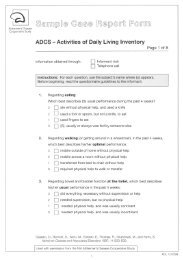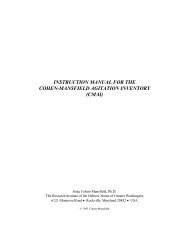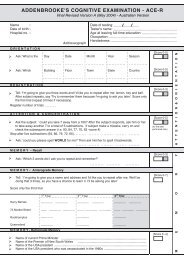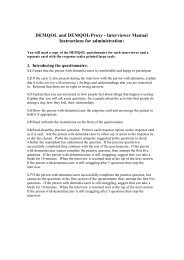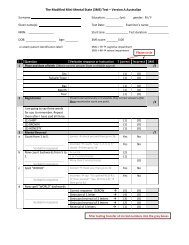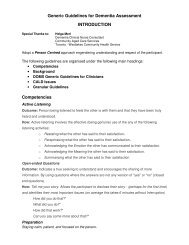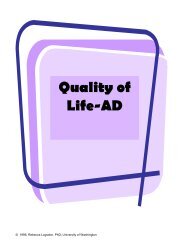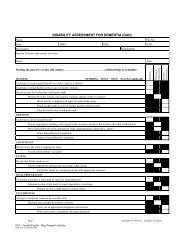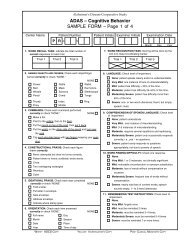Nursing Management of Disturbed Behaviour in Aged Care Facilities
Nursing Management of Disturbed Behaviour in Aged Care Facilities
Nursing Management of Disturbed Behaviour in Aged Care Facilities
You also want an ePaper? Increase the reach of your titles
YUMPU automatically turns print PDFs into web optimized ePapers that Google loves.
4. Instigate consistent plan<br />
• Make sure all staff members and family are aware <strong>of</strong> the plan<br />
• Discuss plan at all handover meet<strong>in</strong>gs<br />
• Monitor consistency <strong>of</strong> approach<br />
• Plan regular evaluation and modification <strong>of</strong> care plan.[4,33]<br />
5. Use effective communication skills<br />
<strong>Nurs<strong>in</strong>g</strong> <strong>Management</strong> <strong>Aged</strong> <strong>Care</strong><br />
• Use the preferred name and make sure hear<strong>in</strong>g aid and glasses are on & <strong>in</strong> work<strong>in</strong>g order<br />
• Provide appropriate language and cultural practices with INTERPRETER help<br />
• Introduce yourself each time you approach the person<br />
• Use careful listen<strong>in</strong>g skills and PRAISE<br />
• Consider appropriate voice tone, body language, touch<br />
• Give appropriate clues to reality when us<strong>in</strong>g known social history<br />
• Accept & validate the feel<strong>in</strong>gs and ideas expressed. [35,36,37, 50]<br />
6. Adapt environment<br />
• Adapt or modify detrimental environment (? homelike, light, noise, BOREDOM etc)<br />
• Consider SECURITY measures if wander<strong>in</strong>g is likely. [34,35, 37]<br />
7. Provide activity programme<br />
• Avoid boredom and lonel<strong>in</strong>ess<br />
• Plan appropriate activity programme.<br />
• Consider discussions, rem<strong>in</strong>iscence, music, exercises, visitors. [37, 54]<br />
8. Medication<br />
• Consider medication TRIAL if depression, PAIN or psychosis is likely<br />
• If person rema<strong>in</strong>s distressed, SHORT TERM traditional or atypical psychotropic medication MAY<br />
be helpful <strong>in</strong> small doses repeated <strong>of</strong>ten, but must be closely monitored for Park<strong>in</strong>sonian<br />
side-effects which are particularly likely <strong>in</strong> Lewy Body Disease.<br />
• Seek expert advice.[16,39,40, 41]<br />
9. Independence and mobility<br />
• Encourage person to do as much as possible for themselves<br />
• Encourage participation <strong>in</strong> exercise programme<br />
• Ma<strong>in</strong>ta<strong>in</strong> dignity and promote self confidence<br />
• Prevent loss <strong>of</strong> strength. [42]<br />
10. Normalise sleep-wake cycles<br />
• SHORT rest period only <strong>in</strong> the afternoon<br />
• Exercise, stimulation & sunsh<strong>in</strong>e dur<strong>in</strong>g the day<br />
• Use bedroom for sleep only<br />
• Avoid caffe<strong>in</strong>e but provide light snack <strong>in</strong> even<strong>in</strong>g<br />
• Provide help and reassurance with toilet<strong>in</strong>g and orientation at night<br />
• Accept that a person may be wakeful at night and provide reassurance and gentle activities<br />
such as favourite music [43].<br />
11. Document, monitor and evaluate<br />
• All care and changes MUST be documented<br />
• Confused people cannot tell you what is wrong with them & cannot ask for help, particularly with<br />
PAIN management<br />
• Older people have changed symptom presentation<br />
• Monitor for new delirium &/or depression<br />
• Review <strong>Care</strong> Plan daily and modify when necessary<br />
• Consult with local <strong>Aged</strong> <strong>Care</strong> team.



